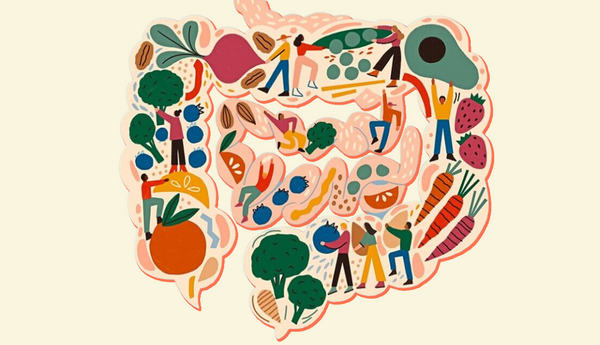No Products in the Cart
Unravel the fascinating links between your gut health and sleep quality, and discover simple lifestyle tweaks that can revolutionise your nights.
Your gut houses both benevolent and malevolent types of bacteria. The adult intestinal tract is a bustling metropolis of approximately 1,000 types of microbiota (Li et al., 2018), which silently ward off viruses and harmful bacteria. At the same time, 70% of your immune system resides in your gut (National Institute of Allergy and Infectious Diseases, 2013), making sure the bacteria and germs in the gut don't cross their boundaries.
What if I told you that your gut and sleep patterns are in a complex tango? The human gut, often referred to as the "second brain", has a direct connection to your grey matter, and here's the kicker - it plays a significant role in how well you sleep (Li et al., 2018).

But why does this even matter? Here's the scoop: sleep is intimately linked to your immune system. Emerging studies have begun to shed light on how the gut and sleep can impact each other (Smith et al., 2019). High-quality sleep nurtures a robust immune defence, ensuring your gut flora remains in tip-top shape.
Here's where it gets even more intriguing: during sleep, parts of your immune system kick into high gear (Ganz, 2012). When white blood cells detect an invader, they release cytokines, which act as messengers for the immune system, orchestrating its responses to diseases and pathogens.
However, there's a catch. This activity is influenced by sleep and your body's internal 24-hour clock, known as the circadian rhythm, which is in turn affected by your diet, meal timings, and sleep patterns.

Research has shown that even mild sleep deprivation can negatively impact gut health (Benedict et al., 2016). This manifests as reduced insulin sensitivity, a decrease in beneficial gut bacteria, and changes in the microbiome linked to type II diabetes.
Sleep deprivation can cause inflammation by releasing the pro-inflammatory cytokines, which in turn can change the composition and abundance of intestinal microbes (Zhang et al., 2023).
Sleep deprivation isn't just about feeling groggy. Poor sleep quality can wreak havoc on cognitive and neuro-behavioural performance and has been linked to cancer and Alzheimer's (Smith et al., 2019).

You can bolster your sleep by encouraging the growth of good bacteria in your gut.
What's more, you don't have to wait until your first cup of coffee to feel invigorated.
So, how can you wield the power of your gut to seize the night? Here are actionable steps:
Remove these products from your diet to help your gut:
Add these products to your diet to help your gut:
Sleep, gut health and immune system are inextricably intertwined. Skimping on sleep throws your gut microbiome off-kilter, making you susceptible to a host of issues such as leaky gut, inflammation, and serotonin deficiencies. This vicious cycle continues as your compromised gut makes it even harder to catch those precious Z's.
By valuing and nurturing your gut through a healthy diet and sufficient sleep, you can break the cycle. The payoff? Improved sleep quality and an enhanced zest for life!